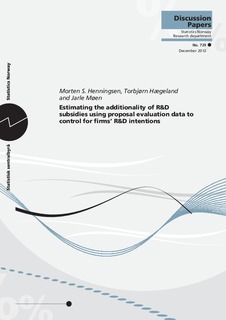Estimating the additionality of R&D subsidies using proposal evaluation data to control for firms’ R&D intentions
Working paper
Published version
Permanent lenke
http://hdl.handle.net/11250/2628014Utgivelsesdato
2012-12Metadata
Vis full innførselSamlinger
- Discussion Papers [1003]
Sammendrag
Empirical examination of whether R&D subsidies to private firms crowd out private investments has been hampered by problems related to selection. A particular worry is that research intentions and the quality of current research ideas may be correlated with the likelihood of applying for and receiving subsidies. Proposal evaluation data has been put forward as a potential remedy. Using such data from Norway, we do not find strong evidence suggesting that this type of selection creates a severe bias. Proposal evaluation grades strongly predict R&D investments and reduce selection bias in cross-sectional regressions, but there is limited variation in grades within firms over time. This suggests that unobserved project quality is largely absorbed by firm fixed effects. Our best estimate of the short-run additionality of R&D subsidies is 1.15, i.e., a one-unit increase in subsidy increases total R&D expenditure in the recipient firm by somewhat more than a unit. We demonstrate, however, that there is severe measurement error in the subsidy variable. Additionality is therefore likely to be underestimated, and we conclude that measurement errors may be a more important source of bias than selection when panel data are available.
Utgiver
Statistisk sentralbyråSerie
Discussion papers;729Beslektede innførsler
Viser innførsler beslektet ved tittel, forfatter og emneord.
-
The impacts of alternative policy instruments on environmental performance. A firm level study of temporary and persistent effects
Bye, Brita; Klemetsen, Marit Elisabeth (Discussion papers;788, Working paper, 2014-10)We study the effects of various environmental regulations on environmental performance measured as emission intensity. Moreover, we aim to test whether any such effects are persistent or only temporary. Conventional theory ... -
The welfare effects of carbon policies: grandfathered quotas versus differentiated taxes
Bye, Brita; Nyborg, Karine (Discussion Papers;No. 261, Working paper, 1999)Recently, it has been demonstrated that pre-existing distortionary taxes can substantially increase the costs of market-based instruments which do not raise revenue, such as non-auctioned emissions quotas. Revenue-raising ... -
Labour market rigidities and environmental tax reforms : welfare effects of different regimes
Bye, Brita (Discussion Papers;No. 242, Working paper, 1998)The working of the labour market is important for the total welfare effects of tax reforms. This paper analyses, by using a computable general equilibrium model for the Norwegian economy, how different assumptions about ...
